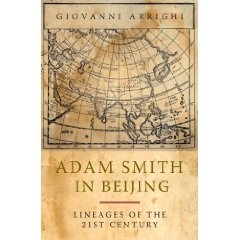
REVIEW (Guest) by By Malvin
Mr. Arrighi tracks the global turbulences that have been wrought as a consequence of the Western development path; the process of creative destruction inherent in the capitalist model has grown ever larger beginning with the small Italian city-states to the Dutch, British and, finally, the American empire. The author shows how each successive wave of accumulation collapsed as a consequence of escalating administrative costs including the funding of ever larger armed forces; of course, the strategy did succeed during much of the 19th and 20th centuries as China fell under domination as a consequence of the West's advantages in military technology. However, the book describes how the failures of the George W. Bush administration's economic and foreign policies are but the culmination of an ill-conceived, decades-long neoliberal project of world domination that bears striking similarity to previous fallen empires. Ironically, as U.S. hegemony has unraveled in the wake of the Iraq War, the author contends that widespread economic prosperity has allowed the Asian nations to emerge as the true victors of the U.S. War on Terror.
Against this backdrop, Mr. Arrighi contemplates three different foreign policy approaches that the U.S. might consider as the Asian Age unfolds. The interconnectedness of the U.S. and Asian economies suggests to us why the differing proposals made by Robert Kaplan, Henry Kissinger and James Pinkerton have all been pursued to varying degrees simultaneously, amounting to a confused and conflicted U.S. Asian policy. Interestingly, Mr. Arrighi posits that China simply does not need to pursue a militaristic path to attain preeminence as long as the U.S. seems bent on self-destruction through its strident diplomacy and economic indebtedness; indeed, the U.S. is rapidly becoming irrelevant as more and more investment decisions are being made in Asia with less and less input and participation from U.S. business partners.
Unfortunately, for a book that is subtitled “Lineages of the Twenty-First Century” the author provides scant attention addressing three major challenges that lay ahead for China: environmental deterioration, the lack of democracy and growing income inequality. Readers interested in these issues might refer to Elizabeth C. Economy's The River Runs Black: The Environmental Challenge To China's Future (Council on Foreign Relations Book), which argues that continued neglect of China's burgeoning environmental crisis will seriously curtail and constrain its future economic growth; and James Mann's The China Fantasy: How Our Leaders Explain Away Chinese Repression, which advances some of the reasons why democracy remains unlikely in China for many years to come. Whereas Mr. Arrighi is practically silent on these issues, both of these books suggest that serious internal conflict between a repressed Chinese working class and a privileged political class will become all but inevitable. In my view, Ms. Economy's and Mr. Mann's books serve as necessarily sobering counterweights to Mr. Arrighi's decidedly more ebullient narrative.
The above minor reservations notwithstanding, I highly recommend this brilliant, timely and informative book to everyone.




